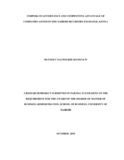| dc.contributor.author | Munyefu, Nalwelisie H K. W | |
| dc.date.accessioned | 2019-01-31T09:02:45Z | |
| dc.date.available | 2019-01-31T09:02:45Z | |
| dc.date.issued | 2018 | |
| dc.identifier.uri | http://hdl.handle.net/11295/106161 | |
| dc.description.abstract | Competitive advantage is based on the concept that firms look for strategies that will help it to offer quality product and services better than its competitors in the market. Poor corporate governance has led to failure and stagnations of many companies that were performing well. The study’s objective was to establish the effect of corporate governance practices on the competitive advantage of NSE listed companies. It is believed non listed firms will gain valuable insights on the effective competitive advantage strategies that can be employed in order to improve their performance. The study reviewed theories of corporate governance and competitive advantage. To establish a link with related previous studies an empirical literature review study was conducted. Four independent variables of corporate governance practices that affect competitive advantage i.e. audit committee, board diversity, board independence and frequency of board meetings were investigated. The study used cross sectional survey design. A cross sectional study was deemed appropriate since the study intended to collect detailed information through descriptions and is useful for identifying variables. The study population comprised of all the 66 companies listed at the NSE. All of the companies participated hence the study was a census. The study used primary data which was collected using semi structured questionnaire. The field data gathered was analysed using the statistical package for social sciences (SPSS version 20). Mean scores, standard deviations, percentages and frequency distribution were used to summarize the responses and show the magnitude of similarities and differences. The relationships amongst the study variables were analysed in a simple regression analysis. The study concluded that corporate governance practices affect competitive advantage to a large extent. Further, the study concludes that core competencies to a large extent influences competitive advantage. The study also concludes that audit committee positively affects competitive advantage, board diversity positively affects competitive advantage, board independence negatively affects competitive advantage and board meeting frequency negatively affects competitive advantage. The study recommends that policy makers should design appropriate policies that regulate the overall Kenyan economy. The study recommends that the management of companies listed at NSE should devote in implementing corporate governance practices. The study recommends that the management of companies in Kenya should invest more on their core competencies. | en_US |
| dc.language.iso | en | en_US |
| dc.publisher | University of Nairobi | en_US |
| dc.rights | Attribution-NonCommercial-NoDerivs 3.0 United States | * |
| dc.rights.uri | http://creativecommons.org/licenses/by-nc-nd/3.0/us/ | * |
| dc.title | Corporate Governance and Competitive Advantage of Companies Listed in the Nairobi Securities Exchange, Kenya | en_US |
| dc.type | Thesis | en_US |



